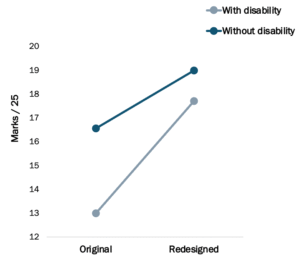School assessment receives a lot of attention. Most of this attention is directed towards students’ performance in NAPLAN, the Year 12 school certificate and PISA and, particularly, how well students do in comparison to their peers in other schools, states, or other parts of the world.
But is that where we should be directing our attention? What if students’ performance in assessment is affected by the accessibility of the task sheet?
Our decade-long program of research on Accessible Assessment began with these two questions. The short answer is that we should be directing far more attention to the accessibility of assessment task sheets because it does impact student performance.
Poorly structured, inconsistent, contradictory, and verbose task sheets create barriers to student comprehension. Visual busyness adds to information processing load.
Together, these elements create unnecessary work for students, increasing the risk they will miss or misinterpret information that is important for their mark.
Inaccessible task sheets also create additional work for teachers who spend time explaining and re-explaining the task in class, responding to student requests for clarification, and correcting misconceptions in student drafts.
Our research has demonstrated that applying our Accessible Assessment design principles to task sheets significantly improves students’ assessment experiences and outcomes.

Teachers benefitted too. Because students better and more quickly understood the task, teachers could spend more lesson time delving into substantive content, deepening students’ learning in the process. Teachers reported fewer requests for clarification and higher quality drafts.
The results from this world-leading research have been published in our new book, Accessible Assessment and Pedagogies: Improving student outcomes through inclusive practice.
In 2025, we commenced a new project working with 11 primary and secondary schools to test the impact of Accessible Assessment across subjects and task types. And, in 2026, we will work with classroom teachers to learn how best to amplify the effect of Accessible Assessment in the classroom.
![speech bubble outline with text reading "I found explaining it to the students initially, um, they seemed to get it quicker [and] they seemed to understand what needed to be done quicker. (Participant 9)](https://research.qut.edu.au/accessibleassessment/wp-content/uploads/sites/356/2025/11/Picture1-300x168.png)
We want all students and teachers to benefit from Accessible Assessment. Use this link to register your interest in upcoming workshops and forums and we will make sure that you receive an alert!